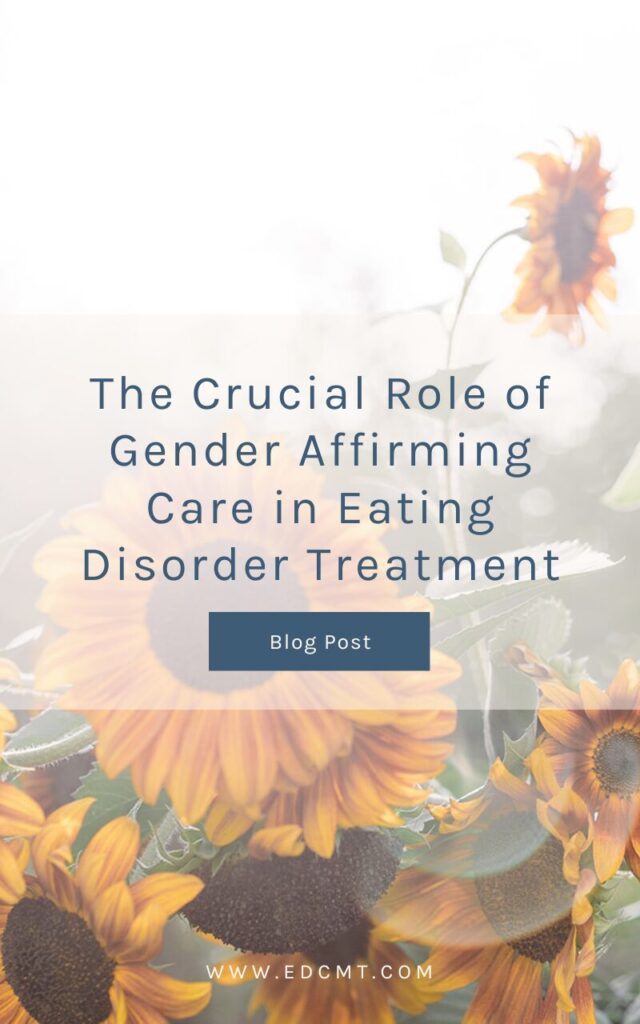The importance of acknowledging and addressing gender diversity in eating disorder treatment cannot be overstated. Gender-affirming care isn’t just a matter of respect; it’s vital to ensuring successful outcomes for all individuals struggling with eating disorders. At the Eating Disorder Center of Montana (EDCMT), our goal is to provide the best care possible to our patients, no matter their gender or their gender identity, including when their gender identity is different from the gender they were assigned at birth.
Understanding Gender Affirming Care
First, it’s crucial to understand what we mean by gender-affirming care. This phrase has become a buzz word in recent years, but according to the World Health Organization (WHO), gender-affirmative health care “includes practices and services that affirm an individual’s gender identity, and are respectful, safe and supportive.” In both behavioral health settings and medical settings, this approach recognizes and validates each person’s gender identity, creating an environment where they feel understood and respected.
The Impact of Gender Incongruence in Eating Disorder Treatment
Research published in the Journal of Eating Disorders sheds light on the profound impact of not taking gender identity into account during eating disorder treatment. When individuals undergo weight restoration without consideration for their gender identity, hormone levels and body shape can become incongruent with their gender identity, leading to added distress and potentially compromising recovery efforts.
Recent research underscores the urgency of integrating gender-affirming care into eating disorder treatment protocol. Studies indicate that transgender individuals are at a significantly higher risk of developing eating disorders compared to cisgender individuals. According to the National Eating Disorders Association (NEDA), transgender and gender non-conforming individuals are estimated to have a 50% higher prevalence of eating disorders than cisgender individuals.
Despite the heightened risk of having an eating disorder, transgender individuals often face significant barriers to accessing appropriate eating disorder treatment, including a lack of knowledgeable healthcare providers, discrimination, and fear of being misunderstood or misgendered during treatment. Gender-affirming care has been shown to improve treatment outcomes for transgender individuals with eating disorders. Research suggests that when treatment aligns with an individual’s gender identity, they experience reduced distress and better overall well-being, contributing to more successful recovery journeys.
Inclusive Care at EDCMT
At EDCMT, our treatment methods are trauma-informed and emotion-focused. We prioritize creating a safe and welcoming environment, where individuals can always feel safe to express themselves, including their gender identity, without fear of judgment or discrimination.
We believe that a one-size-fits-all approach to eating disorder treatment is not effective, especially in the context of gender diversity. To truly support individuals on their path to recovery, we adopt a more inclusive approach that acknowledges and affirms each person’s unique gender identity.
Our providers tailor treatment plans to meet the specific needs of each individual – no matter what those needs may be – taking into account their personal preferences, including how they may prefer to identify themselves.
In addition, we are continually educating ourselves on how to better meet patients at the intersection of their eating disorder, lived experiences, and co-occurring disorders.
By prioritizing gender-affirming care in eating disorder treatment, our team at EDCMT looks to pave the way for more inclusive and effective approaches that support the diverse needs of all individuals on their journey to recovery. Our goal is to embrace a holistic model of care that honors and celebrates the diversity of the human experience.
For questions about the types of care we provide, we encourage you to contact us and learn more.
Sources:
Gender incongruence and transgender health in the ICD: https://www.who.int/standards/classifications/frequently-asked-questions/gender-incongruence-and-transgender-health-in-the-icd#:~:text=What%20is%20gender%2Daffirmative%20health,affirm%20an%20individual’s%20gender%20identity
Riddle, M.C., Safer, J.D. Medical considerations in the care of transgender and gender diverse patients with eating disorders. J Eat Disord 10, 178 (2022). https://doi.org/10.1186/s40337-022-00699-3

